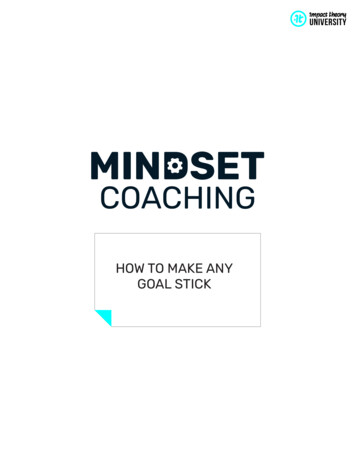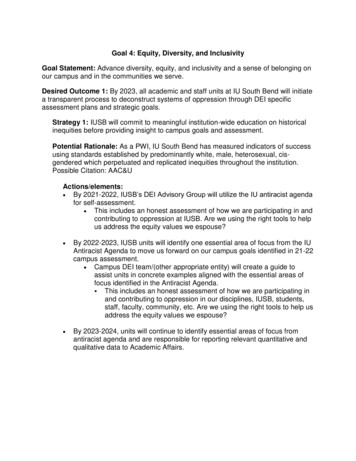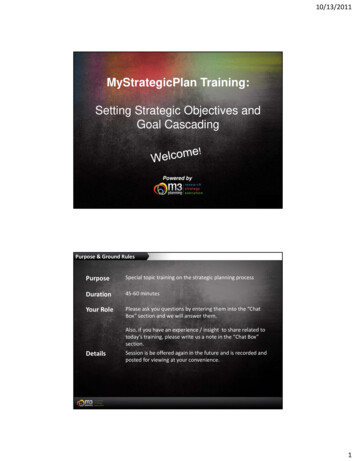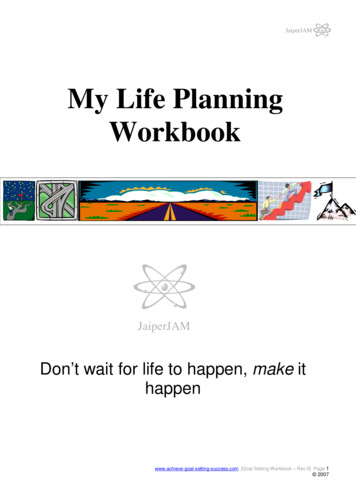
Transcription
UNIVERSITYCOACHINGHOW TO MAKE ANYGOAL STICK
01SUMMARYHere is the hard reality - most dreams never come true. What makesdreams never come true? Why is it so hard? It takes sustainedeffort to reach your dreams. Not just once, but commitment, overand over. You will encounter obstacles, but you must be unrelentingin your goals.Progress is a fundamental pillar of happiness. Progress is aprocess. It’s like going to the gym. Going one day and working yourbutt off won’t get you anywhere, but going for 20 minutes a day, 6days a week will change your life. Get the process right and you cando anything!Anyone can go hard for a couple of weeks, but it’s hard to do itconsistently. Let this sink in. 92% of people who set New Year'sgoals never actually achieve them. Failing to meet goals isfrustrating and can set you back. That leaves 8% of us in a very elitecategory of goal-achievers. The goals for this class are to teachyou how to develop the process and stick to any goal!*This worksheet is designed to briefly outline key points from the videos and help buildon what was taught. This is not a detailed summary of every point. For deeperexplanations on each point, re-watch the videos and take notes! If you have any furtherquestions, be sure to post in the ITU community group.
02WHY PEOPLE FAILPeople fail to make progress for two reasons:1. They aren’t consistent, or they just quit. Don’t quit! If you get offtrack, right the ship immediately.2. They fail to progress for mechanistic reasons. This means theydon’t have the right strategies.Why do people struggle with this?1. “Realistic” goals don’t work. Think big.2. We don’t “want” it badly enough. Cultivate your desire!3. We have limited focus.4. We can do anything, but not everything.5. We get distracted.6. Progress requires CONTINUOUS energy.
03CHALLENGES TOACHIEVING YOUR GOALSWhatever your goal is, about the only sure thing is that it’s going tobe hard. What makes it hard is that it is unrelenting. Time has a wayof wearing on all of us. Those who do well come up with copingstrategies for the length of the race.Fatigue is what breaks people and knocks them off their goal.Fatigue- and this weird sense that getting off track justifies goingway off track. Being consistent is most important.Another thing that messes people up is feeling smaller (inferior) thanthe task. For example:1. We get overwhelmed.2. We feel inferior.3. We feel broken and start to think that others can do it, but not us.You’re going to have a negative voice. Never allow yourself to feelhelpless or hopeless!Most people shrink their goals to fit their skills. We must figure outhow to adjust our action steps:1. Develop your skills to fit your goals. Don’t panic, skill developmentis going to be a process for improvement.2. You don’t need to believe in yourself, you just need to believe inthe human animal’s ability to improve. Don’t make excuses!
045 KEY PRINCIPLES OFSUCCESSFUL GOAL SETTING01CommitmentYou can’t just want it, you’ve got to be all the way in and preparedto see it through to completion. This means you won’t stop atobstacles that come up. You must be tenacious and ferociousabout getting to completion.02Clarity03ChallengingYou must know EXACTLY what you’re trying to accomplish.If the goal isn’t hard enough to stretch you, you’re less likely tocomplete it. Humans desire to progress and improvement is afundamental driver. The goal needs to be big enough to beexciting.04Task ComplexityThe goal should be hard, but not too hard. If you’re overwhelmed,you’ll shut down.05FeedbackEngage with others to cheer you on and to tell you when you’re offtrack. Social accountability is very important.
05THE HOW/WHAT EQUATIONAccording to a study in 2005 by a researcher named Miner, there arethree things that make you more likely to achieve your goal:1. You must actually be committed to it.2. You must perceive it as something valuable to attain.3. You must have a sense of what you’d need to do to actually achieve it.This is where a lot of people struggle. Immerse yourself in the world ofyour goal. As you learn, your plan will take shape. Research by gettinginvolved, and learn through doing - don’t just read about it.
06THE 7 KEY STEPS OFEFFECTIVE GOAL SETTINGKEY 1: CLARITY AND FOCUSClarity - Write the goal down and be specific! Have a deadline. Include detailson how you’re going to achieve your goal. Have action items. If your goal isweight loss, what will you change and do?Focus - Being clear isn’t enough, you must sustain focus, but sustainingfocus is difficult as it will require reinforcement and excitement. Surroundyourself with imagery that reminds you of what you’re trying to do. Meditateon it. Obsess over it. Ritualize it. Constant interaction is one of the benefits ofconsistency as it keeps the idea alive in your mind and helps you buildmomentum.KEY 2: CREATE MASSIVE EXCITEMENTChoose wisely. If you’re not excited, pick a different goal! You’ve got to wantit! To want it, you must be excited. Desire is a process. Desire is the wind thatpushes the sailboat along and if you really want to get somewhere, build anengine of desire.The 3-Step Process for Building Desire:Step 1: Visualize. Put imagery up about your goal.Step 2: Think about why you care. Find a strong “why”.Step 3: Invest emotionally. Tell yourself you’re excited and get hyped. Thebigger your expressed excitement about the goal, the more your mind willrationalize the heightened importance of it.People are more likely to see a goal through when it’s bigand exciting. SET BIG GOALS!
07KEY 3: MASSIVE PRESSUREYou must commit. Decide on your identity: Who do you want to be?You can actually be that person, but in order to be accountable, youhave to be invested in your identity. This needs to be real to you. Tellpeople what you’re doing because peer pressure helps. Surroundyourself with others in the fight, ideally it should be people with sameor similar goal. This helps create a fear of failure.Reward and Punishment: Hype yourself when you make progressand celebrate milestones, but double down on your disciplinedirectly after. Celebrations should propell you forward, not slow youdown. Reward sincere pursuit, not just milestones!KEY 4: BE STRATEGICStart with a hypothesis. Be realistic about it and take your best guessregarding what it would take to achieve your goal. You don’t needmore than a simple wireframe to start.Do research: Find out who’s achieved a goal like yours before. Whatworked for them? Why did that work?Remember, things will likely be different for you. Times change andyou can’t replicate everything that’s been done before and that is whyyou need to understand WHY it worked. The why will be more usefulthan the what. If you get bored, put your phone down! You need tocreate space for “looping” or mapping out your plan. Write thingsdown! Put it in priority order, like dominos. Set your intention beforebed and meditation time, this will also help to lock it in.
08KEY 5: TAKE ACTIONIf it’s a physical goal, go to the gym! If not, go to your “gym” and do it.Don’t wait for research to be complete, just go! Your action will help toinform your research.Effective action requires you to do the following:- Focus.- Surround yourself with immagery- Meditate on your goal/intention.- Obsess over it.- Create bright and clear lines so you know where the destination is.KEY 6: EVALUATE PROGRESS & ADJUSTWhat gets measured tends to get improved, so know your metrics.Figure out what metrics matter for success in your goal. For example,with goals regarding your body:- Know your strength. Are your PRs going up?- Know about body fat %. Is your body fat % going up or down?- Know your muscle diameter.- Log your time in the gym. This is indirect, but highly correlated tosuccess such as number of sets and reps.- Know about blood sugar.Be able to adjust your approach!KEY 7: HOLDING YOURSELF ACCOUNTABLEDon’t quit! Remember that it will be hard but worth it. Be disciplined!Discipline is all about self-control. Self-control is the holy grail ofpersonal assets.
09ACTION ITEMS01GET CLEAR. Think through the specific details of your goals,02Give each of your goals a DEADLINE. How do you plan onremembering to think big! Write them down.measuring your progress?
1003Develop your ability to FOCUS.a. Try taking a dopamine fast. Put your phone down and allowyourself the space to get bored. Don’t check text messages oremails except during designated times.b. Meditate: Mindfulness meditation will help you extend theperiod that you can focus.READING LIST:1. Angela Duckworth’s Grit2. Tim Grover’s Relentless
NOTES
NOTES
NOTES
you how to develop the process and stick to any goal! *This worksheet is designed to briefly outline key points from the videos and help build on what was taught. This is not a detailed summary of every point. For deeper explanations on each point, re











